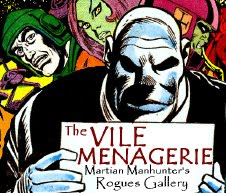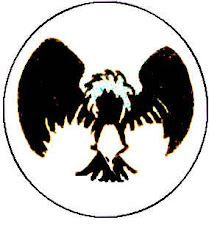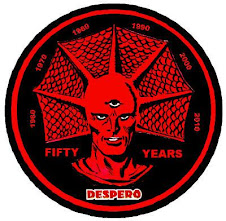
In 1999, Gail Simone made her initial name in comics through Women in Refrigerators, a web page devoted to listing all the violent indignities inflicted against female characters over the years. For some reason, Women Write About Comics decided to discuss the site as a meme at the curious thirteenth year mark. I figured I'd try my hand at a Manhunter-centric list, but it's pretty weak. The truth is, women didn't play a large part in the Martian mythos prior to 1988. Detective John Jones was occasionally partnered with rookie Patrolwoman Diane Meade, and even sorta-kinda dated her in an issue of Justice League of America, but Jones was really one of the most chaste mainstream heroes. J'Onn's mom showed up a couple of times in the Silver Age, and a grandmother cameo'd once in the Bronze. J'Onn seemed affectionate towards Bel Juz in 1972, but his first official girlfriend (J'en) didn't debut until almost three decades into his career (and for only one story arc!) Readers would be forgiven for assuming there was something to that "Manhunter" handle.

Women didn't truly impact on the character until his unnamed wife and daughter were revealed in a 1988 mini-series, turning the character from a confirmed bachelor to a widower in mourning for decades. This tragic-romantic element became firmly ingrained in the character, greatly enhancing his appeal to readers of both genders. J'Onzz's celibacy continued, but it was now somber rather than queer, and he finally began a string of short term, problematic relationships in the late '90s. Around the same time, the Manhunter from Mars' untold history was thoroughly explored, and it was here that most of the violence against women took place (often under writer John Ostrander and related to an evil twin brother, Ma'alefa'ak, soon to debut in cartoon form.)

Bel Juz (in limbo since 1984)
Bette Noir (enslaved by Dr. Trap, in limbo since 2000)
Cay'an (in limbo since 2007)
Cha'rissa (adulteress, in limbo since 2000)
D'Kay D'Razz (executed)
Melissa Erdel (permanent brain damage)
Rio Ferdinand (in limbo since 2007)
Gypsy (left for dead, psychically molested, in limbo since 2010)
J'en (in limbo since 1984)
M'yri'ah J'Onzz (mentally raped, killed with daughter by engineered plague)
Sha'Sheen J'Onzz (mentally assaulted by son, lobotomized, killed)
Kishana Lewis (in limbo since 2003)
Diane Meade (brother murdered, in limbo since 2000)
Miss Martian (dissociative personality disorder, homicidal, brutally assaulted, left in limbo)
Mongal (decapitated by brother)
Moon Maiden (retconned, in limbo since 2000)
Primaid (stripped of individual identity)
Scorch (left in coma by Fernus, in limbo since 2007)
Shrike (insane, dead)
Karen Smith (betrayed and murdered)
Tronix (stripped of individual identity)

As far as why women are so mistreated in genre fiction, I have a few theories. The first is that, in our culture, women matter more. Heterosexual men view them as objects of desire and damsels in distress. Failing to protect them is a failure as a man, which cuts deeper than most personal defeats. The dark side of that is that they are also objects to be taken from men, and their (often sexualized) abuse can be titillating or otherwise satisfying for some. In the case of homosexual men, until relatively recently, open relationships with women were the only deep emotional attachments accepted by society. Women seem to hold the opinions of other women in highest esteem, and as traditional gender roles have broken down, women seem to be most deeply invested in other women over the transitory presence of men. As for homosexual women, at least in my own experience, there seems as great a tendency as anywhere to sexually segregate from men entirely. For children, women are their mothers and their emotional nexus, the most important being in their lives.

By contrast, men are historically less emotional in general, and less likely to become attached. They are not as central to home life, with the expectation of being breadwinners in the workplace. Men tend to handle the material functioning of society, rather than nurturing. Biological and emotional bonds aren't as strong, as one man can impregnate many women without necessarily being responsible for any of the consequences. It is part of societal expectation for men to be sacrificed to protect and serve the tribe. As the physically dominant gender, they are the most likely to victimize the weak, coloring perceptions of the sex. Men are least likely to be victimized themselves, at least as adults, and their being sexually abused remains a taboo to be suppressed as thoroughly as possible. Violence is expected from and against men, so it lacks the sense of shock or transgression. It doesn't hurt the audience as much to hurt a man, and there's even a weird sort of valor taken from torture of the male. These views are changing, but it's still part of our culture.

One other thing I think is worth noting is that comic books shifted from short, unconnected action stories in the Golden Age to long form, character-based serialized tales ever since. In doing so, comics adopted many of the tropes of a feminine skewing genre, the soap opera. Perhaps because of the rapid changes in gender roles in the industrialized world and through the sexual revolution, women's entertainment has often struck me as sadomasochistic. Where men are more likely to prefer simple conflicts of good versus evil, the lowest common denominator in women's entertainment seems to be stories of manipulation and abuse. Comics' tendency to put women in harm's way, especially as executed since the Silver Age, seems derived from the conventions of the soap opera and wrenching feminine fiction as a whole at least as much as geeky white male writers working out their personal issues in a ghettoized medium. Just a theory, though...






























6 comments:
I think that you have several valid points here, as I think that women have often been thinly portrayed in comics.
As for J'Onn, I would argue that he is in someways a more tragic character than either Superman or Batman. Superman lost his homeworld, but did not grow up there. Indeed, in the most recent DCU, Kal-El largely saw himself as a human at heart. Batman lost his parents, but not his world. J'Onn has lost both his family and his world. If you combine the Silver Age brutality of the Marshall's devastation of Mars, followed by what Malefic did, J'Onn may be the most psychologically resilient character in the DC Universe, having lost everything he loved twice.
True, and given my druthers, I would indeed combine both in the canon.
I never quite thought of comics as soap operas before, but now that you mention it, it fits....
Also this makes me miss Diane Meade. I wonder if she survived the reboot?
That's a good question, given that we don't even know if Detective John Jones did.
I was at a sci-fi con a few weeks ago in boston, and sat on a women in comics panel where some of what you talk about here was discussed. Well done, I'm going to link this for some folks to read.
Muchas gracias, señorita! Wait-- was that patronizing chauvinism? Stupid comics broke my sensibilities!
Post a Comment